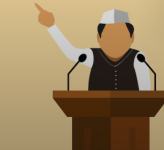When we hear the word “politics,” many think of election rallies, fiery debates, or social media spats. But beyond the headlines and hashtags, politics is the art of shaping society—deciding who gets what, when, and how.
Whether you follow it actively or try to avoid it, politics affects everything—from the price of fuel to your freedom of speech. And in today’s rapidly changing world, it matters more than ever.
While this digital shift has made politics more accessible, it’s also made it noisier. With information—and misinformation—flooding our screens, the line between fact and opinion often blurs. That’s why political awareness is no longer optional; it’s essential.
Today’s voters are informed, vocal, and organized. They ask tough questions. They care about climate action, digital privacy, economic equity, and social justice. They’re not afraid to hold leaders accountable—and that’s exactly how democracy thrives.
Corruption, nepotism, and lack of transparency still plague many systems. And in some nations, voices are silenced instead of heard. These aren’t just political issues—they’re human rights concerns. And they require more than votes—they require vigilance.
We often say, “I’m not into politics.” But the truth is, politics is into us—deeply woven into our daily lives. Whether you’re advocating for gender equality, environmental action, or just safer streets in your neighborhood, you’re engaging in politics.
So the next time you scroll past a policy update or ignore a debate, pause. Ask yourself: If not me, who? If not now, when?
Whether you follow it actively or try to avoid it, politics affects everything—from the price of fuel to your freedom of speech. And in today’s rapidly changing world, it matters more than ever.
From Drawing Rooms to Digital Storms
Gone are the days when politics played out only in parliaments and press conferences. Today, it unfolds on Twitter threads, YouTube debates, and WhatsApp forwards. Politicians are no longer just public speakers—they’re content creators, influencers, and in some cases, internet celebrities.While this digital shift has made politics more accessible, it’s also made it noisier. With information—and misinformation—flooding our screens, the line between fact and opinion often blurs. That’s why political awareness is no longer optional; it’s essential.
The Power of the People
Politics isn’t just about politicians. It’s about people, participation, and public pressure. From student protests to online petitions, we’re seeing a new generation that doesn't wait for change—they demand it.Today’s voters are informed, vocal, and organized. They ask tough questions. They care about climate action, digital privacy, economic equity, and social justice. They’re not afraid to hold leaders accountable—and that’s exactly how democracy thrives.
Challenges We Can’t Ignore
While democracy is expanding in some places, polarization and misinformation threaten its foundation in others. Fake news spreads faster than facts. Political divisions become personal rifts. Dialogue gives way to outrage.Corruption, nepotism, and lack of transparency still plague many systems. And in some nations, voices are silenced instead of heard. These aren’t just political issues—they’re human rights concerns. And they require more than votes—they require vigilance.
Politics as a Force for Good
Despite its flaws, politics remains one of the most powerful tools for change. When used responsibly, it builds schools, hospitals, laws, and liberties. It gives people a platform to be heard and a mechanism to shape the world they live in.We often say, “I’m not into politics.” But the truth is, politics is into us—deeply woven into our daily lives. Whether you’re advocating for gender equality, environmental action, or just safer streets in your neighborhood, you’re engaging in politics.
Final Thoughts: It’s Time to Reclaim Politics
Politics doesn’t belong only to politicians—it belongs to the people. It’s messy, emotional, and imperfect, but it’s also powerful. And when guided by integrity, empathy, and accountability, politics can truly be a force for collective progress.So the next time you scroll past a policy update or ignore a debate, pause. Ask yourself: If not me, who? If not now, when?

